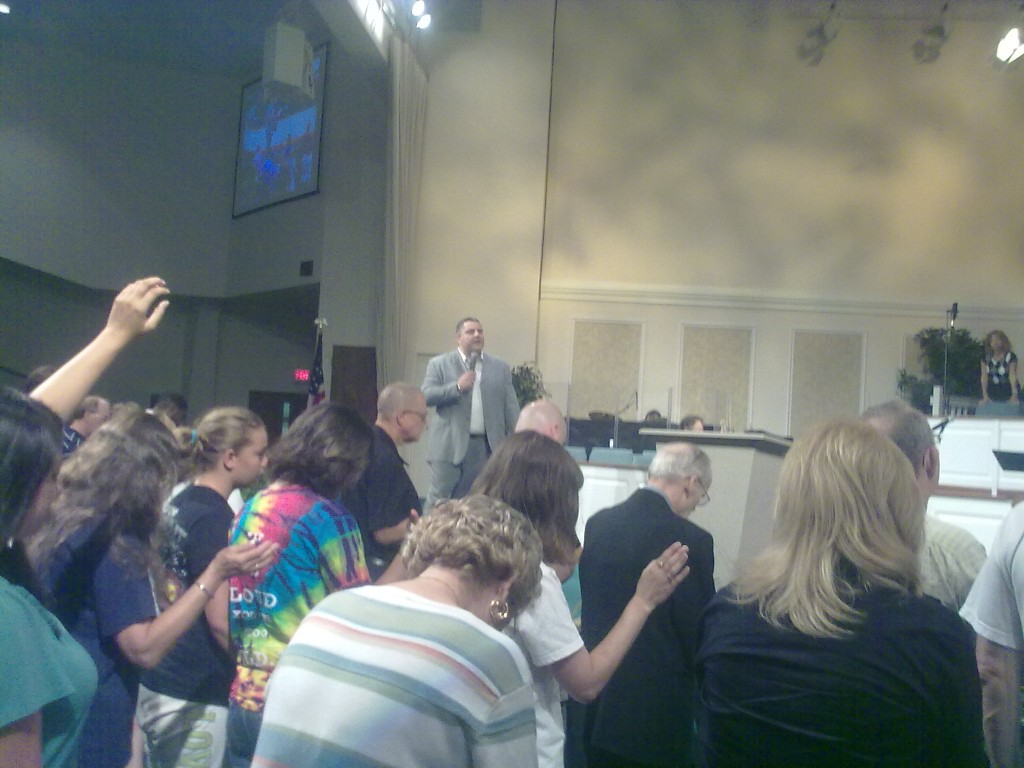America Is Becoming Less Christian, Less Religious
America is still a predominantly Christian nation, but it’s becoming both less Christian and less religious, according to the results of the new American Religious Identification Survey. According to the poll, which came out today, the percentage of Americans who define themselves as Christian has dropped from 86 percent in 1990 to 76 percent in 2008. In one of the most dramatic shifts, 15 percent of Americans now say they have no religion — a figure that’s almost doubled in 18 years. Americans with no religious preference are now larger than all other major religious groups except Catholics and Baptists.
“What seems to be happening is there is a decline in what we might call traditional brand loyalty to the old denominations, specific churches,” said Barry Kosmin, a principle investigator for the American Religious Identification Survey. In the last 18 years, despite population growth and immigration, almost all religious denominations have lost ground. Mainline Protestants are down the most. Methodists, for example, have gone from 8 to 5 percent. Baptists are down from 19.3 to 15.8. And Jews are down from 1.8 to 1.2 percent.
Meanwhile, the number of atheists, while still small, has nearly doubled from 900,000 to 1.6 million. Kosmin says that people may feel more comfortable admitting their lack of faith at a time when atheist books, like Christopher Hitchens’ “God Is Not Great: How Religion Poisons Everything” and movies are getting a lot of attention. Comedian Bill Maher took aim at religion in his documentary film “Religulous,” saying that he preaches “the gospel of ‘I Don’t Know.'”
But researchers point out that just because people are dropping out of organized religion, that doesn’t mean they’re abandoning faith. In an informal poll on Twitter today, we heard similar sentiments.
“I no longer attend church, but still pray to Jesus,” said Sean Whitney.
Dramatic Shift in Way Americans Worship
“I dropped out of the Catholic faith years ago. However, it doesn’t mean I have stopped believing in God,” said Carmen Rivera.
The study finds that more people are exploring spiritual frontiers. Some 2.8 million Americans now say they identify with new religious movements like Wicca, paganism or spiritualists. Catholic strongholds in New England and the Midwest have faded as people have moved toward the Sunbelt.
“We are becoming a nation of spiritually anchored people who are not traditionally religious,” said Serene Jones, president of the Union Theological Seminary in the City of New York.
While Americans may be leaving established denominations, the one major growth area in American Christianity is among evangelicals. Megachurches are booming, rising from 5 to 11.8 percent of the population.
And with the economy in free fall, many megachurches say they’re seeing increased attendance. They’re praying that perhaps hard times will draw Americans back to their faith.
8 Things Christian Believers and Churches Can Do in Light of Recent SCOTUS Ruling on LGBT
1. State Level
- Contact your congressman/senator for available options. Write your governor without hesitation
- Texas Governor Greg Abbott signed a bill allowing clergy to refuse to officiate same sex ceremonies
- Texas Attorney General fights back against Supreme Court
- First Amendment Defense Act Sen. Mike Lee of Utah introduced
2. Personal Level
- Inform yourself and your family of the clear Biblical principles for love and holiness applicable in this situation
- Pray daily for the protection of your family and the salvation of many souls
- Be faithful to your husband/wife and children
3. Corporate Level
- Hold on to your Christian standards for doing business
- Support other Christian businesses
- Forgive and forget, but watch and pray
4. Local Church Level
- Join in corporate fasting and praying in the Spirit
- Uphold the Biblical standard of holy living
- Preach the truth as you have received it
- Adopt local church resolutions on the sanctity of the family
5. Denominational Level
- Adopt resolutions on the sanctity of the family applicable to all your churches internationally (not just North America)
- Adopt resolutions on same-sex marriages, transgender, abortions and all similar issues applicable to all your churches internationally (not just North America)
- Stand along members, ministers, local congregations and Christian schools under attack for upholding the Biblical standard of holy living
6. Christian Alliances Level
- Stay informed of all legal protests and options
- Learn about upcoming IRS changes and alternative exempt options
- Consult with legal council about your rights and obligations under the law
- Join with other Christians in legal measures for upholding the Biblical standard of holy living
7. International Organizational Level
- Beware of what Christian churches are doing internationally to protect their members, ministers, local congregations and Christian schools
- Examine your current tax status and consult your CPA, attorney and insurance agents about the various possibilities to protect your church and ministry
- 2015 ANGLICAN CHURCH Communique
- Methodist church Faces Schism Over Same-Sex Marriage
8. Get good insurance with adequate coverage and experience in the matter
• A good example from Brotherhood Mutual Ins.
READ ALSO:
- Statement of the Church of God Regarding Same-Sex Marriage Court Decision
- AFA: 3 things your church must do immediately to protect itself
- Church of God Instructions for Ministers: Marriage and Same-sex Relationship (75th A., 2014)
- SOUTHERN BAPTIST ADF PLAN TO RESIST ANTI-DISCRIMINATION LAWS
- Web-cached copy of ADF PLAN TO RESIST ANTI-DISCRIMINATION LAWS
- Brotherhood Mutual Ins: What should churches and ministries know?
- 6 More Things To Do after the Supreme Court Decision on Gay Marriage
- Why the church should neither cave nor panic?
- How Will the U.S. Supreme Court’s Same-Sex-Marriage Decision Affect Religious Liberty?
- Why Evangelical Churches Need to Address the New Reality?
- Will High-court ruling affect church weddings?
Preaching at Stewart Road Christian Ministries Center
Will You Vote Christian
KMJ at the Hard Rock Cafe on Beale Street in Memphis
![31854202[1]](http://kmjpraise.com/wp-content/uploads/2012/05/318542021-300x225.jpg) Our friends and long time ministry partners from the KMJ Praise Band have been invited to hold:
Our friends and long time ministry partners from the KMJ Praise Band have been invited to hold:
CHURCH ON BEALE STREET
at THE HARD ROCK CAFÉ MEMPHIS, TN
Join us in prayer to support them and make plans to be there if you are in the area, as they are preparing for this milestone in their ministry. Feel free to share the following poster information:
MATTERS OF THE HEART MINISTRY WITH KMJ PRAISE WILL BE TAKING PART IN “CHURCH ON BEALE” – A DAY OF PRAISE FOR THE LORD IN DOWN TOWN MEMPHIS, TN. SEVERAL CHRISTIAN BANDS HAVE COME TOGETHER FOR THIS AFTERNOON OF PRAISE AND WORSHIP.
ON JUNE 10,2012 KMJ PRAISE WILL START OFF THE CONCERT AT 1:00 PM. COME ONE AND ALL! COME ENJOY THE HISTORIC BEALE STREET, OUR GREAT VIEW OF THE OLE MISSISSIPPI RIVER AND AN AFTERNOON FULL OF PRAISE!
Doors at 11:30am
Show at 12:00pm
Free to the public, all ages are welcome
“Church on Beale” is a faith based concept for groups that may play music in their local churches but would like to reach out with their music to others. Seven groups are signed up to perform. Christian music has evolved over the years and the Hard Rock Cafe is giving some great musicians the opportunity to perform at their location in Memphis. From Southern Gospel to Rock Gospel this event will have quite a variety of, again, “faith based” music! This will be an uplifting event and, we involved in it, want to thank the Hard Rock Cafe for allowing us a venue for the many talented musicians to perform.
Ministering at Stewart Road Christian Ministries Center
Speaking at the Annual Conference of the Bulgarian Christian Student Union in Lyaskovets
 On October 25, 2009 after ministering in the morning service of the Gabrovo Church of God, we traveled to Lyaskovets near Veliko Tarnovo to minister at the annual national conference of the Bulgarian Christian Student Union. The main speaker of the conference was the National Student Coordinator of the Macedonian movement, Nicolas Galevska. Other speakers included, Dr. Benjamin Peev, Zefian Nicholas from Albania, Petyo Valkov, Trife Trifonov and Dr. Dony Donev.
On October 25, 2009 after ministering in the morning service of the Gabrovo Church of God, we traveled to Lyaskovets near Veliko Tarnovo to minister at the annual national conference of the Bulgarian Christian Student Union. The main speaker of the conference was the National Student Coordinator of the Macedonian movement, Nicolas Galevska. Other speakers included, Dr. Benjamin Peev, Zefian Nicholas from Albania, Petyo Valkov, Trife Trifonov and Dr. Dony Donev.
Dr. Donev spoke on “ChristSpace: How to Revolutionize the Internet for Christ”. The well attended session covered various topics on how to minister using the internet with special focus on the growing influence of the social networking movement and upcoming release of Google Wave. A time for questions and answer was left as a round table discussion at the end of the meeting. All present were given a souvenir ring with our website “Bibliata.TV” and encouraged to create and upload their Christian videos to this site using any camera capabilities they may have. We are thankful for the local church team who attended and filmed the event, for their work is essential for the future development for the newly started Church of God congregation in Veliko Tarnovo, where we ministered also before leaving.
Christian Dialogue Established
 Several months ago, in an article entitled “Orthodox Split Deepens” we reported that the Bulgarian Parliament had passed a controversial bill concerning religion. The problems with the legality of the new Confessions Act came into clash with reality when in July 2004 the police raided 250 Orthodox churches arresting several priests from the so-called Alternative Synod. Several developments have followed.
Several months ago, in an article entitled “Orthodox Split Deepens” we reported that the Bulgarian Parliament had passed a controversial bill concerning religion. The problems with the legality of the new Confessions Act came into clash with reality when in July 2004 the police raided 250 Orthodox churches arresting several priests from the so-called Alternative Synod. Several developments have followed.
As it becomes obvious that the new Confessions Act is already failing to respond to the social and spiritual needs of Bulgaria’s postcommunist context, it is unfortunate that its malfunctions prevent an atmosphere of religious freedom, pluralism and tolerance where everyone can experience the right to believe. Thus, the Bulgarian Confessions Act of 2002 cannot and should not be the legal text operating in Bulgaria when the country is accepted into the European Union.
The Act has shown itself insufficient and even harmful for the existence and practice of religion in Bulgaria, as well as to the right of every Bulgarian to freely choose to believe. None of the traditional confessions has experienced positive results from the practice of the Act , as it remains the only Bulgarian law that regulates personal convictions and conscience. In this sense, the Act clearly introduces and enforces discrimination.
The statements made by the Confessions Act’s authors and supporters that its principles of establishing state religion are not a precedent in Europe, but have been implemented and practiced in many Catholic and Protestant European countries is also invalid. The reason is simple and obvious. None of the said countries has passed through half a century of Communist Regime or has worked in a postcommunist context, where not only politics and economy, but the very mentality of the people has been flooded by totalitarianism creating a contemporary reality which has no Western European precedent.
The mentality of the Church is no different. Forced to be indifferent to politics under Communism, the Church remains distanced from culture and society to the point of a minority complex. In that oppressive context, the role and functions of the Church were imposed and strictly regulated by the government. As a result, today the church is failing to recover and reclaim its Biblical identity becoming simply a state institution with predetermined interest in strictly regulated areas of social life.
The Confessions Act of 2002 in Bulgaria attempts a return to an older autocratic style of government, turning the postcommunist Bulgarian context into a postcommunist regime. In the journey toward democracy such approach is without excuse. The state cannot and must not attempt regulatory interference in the rights of the church through the predetermined legality and the pressure of public opinion. It cannot and should allow tradition to dictate special privileges for any denomination. And when the state fails to be the initiator of actions against discrimination and oppression, the Church must and should assume this role.
After the unfortunate police actions, on October 18, 2004 the oppositional Democrats for Strong Bulgaria presented in the Parliament with recommendations for changes of the religious law. Less than a week later, perhaps as a response, the government announced the formation of a new special confessional commission. The commission will combine representatives from several government departments including Christian Dialogue (Continued)
internal affairs, finances and health. The idea strongly reminds of Kremlin’s Interreligious Council, but unfortunately does not include representatives of the religious denominations.
The search for a democratic paradigm which integrates religious freedom and freedom of conscience is not over either. Religious pluralism in Bulgaria will occur, unfortunately, in the already forming postmodern context. The time has come for the Bulgarian Church to rediscover its identity through revisiting its Biblical theology. There, common theological presuppositions presented within the faith of all Bulgarian Christians will lobby religious tolerance and create a healthy environment for the implementation of a new paradigm for ministry which successfully incorporates interdenominational partnership.
The first step toward such a paradigm may have been made as Orthodox, Catholic and Protestant believers came together on October 23, 2004. In an “Universal Character of the Christian Church” round table discussion they considered the possibility of the establishment of religious community where Christians from various denominations can come together for worship in freedom from fear and according to their religious convictions.
Christian Enlightenment Center
Cup & Cross Ministries is working on adding a new department to the Shalom Group, a conglomerate for ministry which we started in 1996. Mission Maranatha and the Bulgarian Christian Television, Shalom TV were among the first successful projects of Shalom Group. The new department is called Christian Enlightenment Center and it will provide Christian media resources, solutions and training on the territory of Bulgaria through the following strategy:
Vision
To fulfill the Great Commission of Christ to the Church, “Go teach all nations …” (Matthew 28:19) as did the disciples of Christ beginning in Jerusalem and then “to the uttermost parts of the world” (Acts 1:8), preaching the Gospel of which were witnesses (Luke 1:2)
Methodology
1. Creating an atmosphere for spiritual upbringing based on the Biblical truths and Christian values of the individual.
2. Return to the Biblical principles which are valid and vital for the society, culture and person.
3. Implementation of the information technologies and communication methods in the presentation of the Bible and Christian resources for spiritual commitment which motivates the search for truth.
Strategy
1. Applying the Biblical principles for Christian living, along with fasting and prayer as a credo for work and ministry.
2. Development and maintaining of a library containing various translations of the Bible, reference literature (dictionaries, concordances), Christian books, newspapers, magazines and brochures.
3. Development and maintaining of an audio library with audio tapes, and CDs with the audio Bible, sermons, teachings and Christian music.
4. Development and maintaining of a library with video tapes, DVDs, and VCDs with Christian sermons, teachings, films and programs.
5. Development and maintaining of an information database with Christian resources and software.
6. Organizing and holding of seminars, conferences and training events to educate of the Biblical principles and Christian values, as well as contemporary computer and information technologies.
7. Supporting and working with local churches, Protestant denominations, missions, foundations and other para-church organizations with similar goals, methodology and Christian morale.








